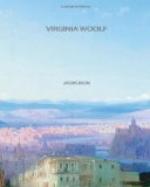Nothing could appear more certain from the steps of St. Paul’s than that each person is miraculously provided with coat, skirt, and boots; an income; an object. Only Jacob, carrying in his hand Finlay’s Byzantine Empire, which he had bought in Ludgate Hill, looked a little different; for in his hand he carried a book, which book he would at nine-thirty precisely, by his own fireside, open and study, as no one else of all these multitudes would do. They have no houses. The streets belong to them; the shops; the churches; theirs the innumerable desks; the stretched office lights; the vans are theirs, and the railway slung high above the street. If you look closer you will see that three elderly men at a little distance from each other run spiders along the pavement as if the street were their parlour, and here, against the wall, a woman stares at nothing, boot-laces extended, which she does not ask you to buy. The posters are theirs too; and the news on them. A town destroyed; a race won. A homeless people, circling beneath the sky whose blue or white is held off by a ceiling cloth of steel filings and horse dung shredded to dust.
There, under the green shade, with his head bent over white paper, Mr. Sibley transferred figures to folios, and upon each desk you observe, like provender, a bunch of papers, the day’s nutriment, slowly consumed by the industrious pen. Innumerable overcoats of the quality prescribed hung empty all day in the corridors, but as the clock struck six each was exactly filled, and the little figures, split apart into trousers or moulded into a single thickness, jerked rapidly with angular forward motion along the pavement; then dropped into darkness. Beneath the pavement, sunk in the earth, hollow drains lined with yellow light for ever conveyed them this way and that, and large letters upon enamel plates represented in the underworld the parks, squares, and circuses of the upper. “Marble Arch—Shepherd’s Bush”—to the majority the Arch and the Bush are eternally white letters upon a blue ground. Only at one point—it may be Acton, Holloway, Kensal Rise, Caledonian Road—does the name mean shops where you buy things, and houses, in one of which, down to the right, where the pollard trees grow out of the paving stones, there is a square curtained window, and a bedroom.
Long past sunset an old blind woman sat on a camp-stool with her back to the stone wall of the Union of London and Smith’s Bank, clasping a brown mongrel tight in her arms and singing out loud, not for coppers, no, from the depths of her gay wild heart—her sinful, tanned heart—for the child who fetches her is the fruit of sin, and should have been in bed, curtained, asleep, instead of hearing in the lamplight her mother’s wild song, where she sits against the Bank, singing not for coppers, with her dog against her breast.
Home they went. The grey church spires received them; the hoary city, old, sinful, and majestic. One behind another, round or pointed, piercing the sky or massing themselves, like sailing ships, like granite cliffs, spires and offices, wharves and factories crowd the bank; eternally the pilgrims trudge; barges rest in mid stream heavy laden; as some believe, the city loves her prostitutes.




